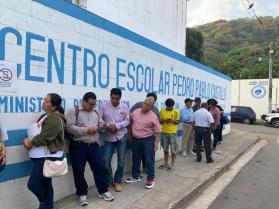William H. Duncan Nominated as US Ambassador to El Salvador
On February 25, 2022, the White House announced President Biden's intention to appoint William H. Duncan as US ambassador to El Salvador. According to the White House press release, Duncan is a "career member of the Senior Foreign Service with the rank of Minister-Counselor, [and] currently serves as a Senior Inspector in the Office of the Inspector General, U.S. Department of State." Former international assignments in the region include Consul General in Monterrey, Mexico, and Deputy Chief of Mission at U.S. Embassy Mexico City, Mexico. He has participated in diplomatic missions in Asunción, Madrid, Baghdad, Mexico City, Bogotá, San Salvador, and Matamoros. Former domestic assignments include posts in the Offices of Andean Affairs, Mexican Affairs, East African Affairs, and Central American Affairs, as well as in the State Department Operations Center.
If confirmed by the US Senate, Duncan’s appointment would fill the vacancy left by Trump-appointed ambassador Ronald Johnson in January of 2021. Since then, former ambassador Jean Manes and Foreign Service member Brendan O'Brian have overseen the US Embassy in El Salvador as interim "Charge D'Affaires.” Duncan will mark the first ambassador appointment to El Salvador under the Biden administration.
During the Trump administration, the United States and El Salvador maintained a notably close relationship, both in terms of policy and among the officials themselves. In 2019, President Bukele hailed his administration for achieving the “friendliest relations with the United States,” and after visiting President Trump in Washington, called Trump “cool.” Likewise President Bukele and Ambassador Johnson were often photographed together in El Salvador on boating trips, at birthday parties, and enjoying other leisure activities with their families. Johnson was also notably present at official functions outside the ambassador’s purview, such as presidential press conferences and other private meetings. Policy-wise, Bukele was a remarkably reliable ally of the United States in upholding the imperialist order during the Trump administration by avidly promoting corporate interests in El Salvador (announcing that the country was “open for business” to private investors soon after taking office) and supporting deeply racist and disastrous hardline anti-migrant policies.
However, after Bukele–increasingly authoritarian–was snubbed by Biden officials in Washington February of 2021, US/El Salvador diplomatic relations deteriorated. In November 2021, Jean Manes left her position, stating that the Bukele administration "had no interest" in improving relations with the United States. Although President Bukele has framed the deterioration as resulting from his “anti-imperialist” refusal to bow to US interests, his administration’s priorities have not changed: It continues to court private foreign investment, selling off land and water to the real estate, tourism, energy, cryptocurrency, and other private sectors. As scholars and activists have noted, Bukele’s project is not a challenge to imperialist domination, despite the particular business interests he and his allies represent. In fact, his project only expands that domination into new techno-capitalist markets, such as Bitcoin.
If Duncan is confirmed as the new ambassador to El Salvador, among his responsibilities will be working with the Salvadoran government to forcefully stem migration through militarized “security” initiatives and cement the rest of the Biden administration’s plan for Central America. Although the plan is a brazen extension of old, failed development-model policy that seeks cheap labor and raw materials for the benefit of corporations (and thus is actually a driving force of migration), the administration has presented it as a comprehensive solution to the region’s problems and is putting $4 billion behind it. At least 12 companies, including Nestle, Mastercard, and Microsoft have signed on as investors. Duncan, alongside Vice President Kamala Harris who is charged with diplomatic work in the region, and Ricardo Zúniga, special envoy for Guatemala, El Salvador, and Honduras, will be tasked, as previous ambassadors have been before him, with fortifying the US State Department’s neoliberal agenda in El Salvador. It’s yet to be determined how the Bukele administration will receive the new ambassador and how the United States will respond through the embassy to the now undeniable abuses of power that characterize the Bukele presidency. Where their capitalists interests overlap, there is likely to be common ground, but the rest remains uncertain.

 "I am a CISPES supporter because continuing to fight for social justice and a more people-centered country means continuing the dream and sacrifice of thousands of my fellow Salvadorans who died for that vision.” - Padre Carlos, New York City
"I am a CISPES supporter because continuing to fight for social justice and a more people-centered country means continuing the dream and sacrifice of thousands of my fellow Salvadorans who died for that vision.” - Padre Carlos, New York City

